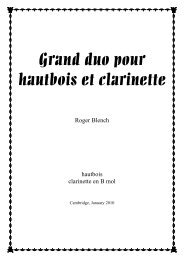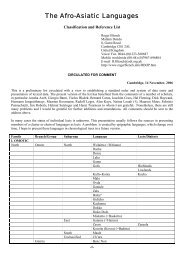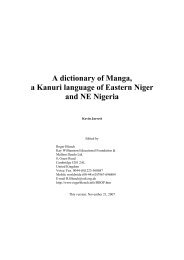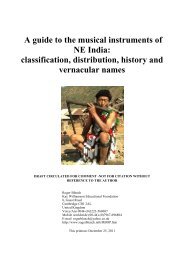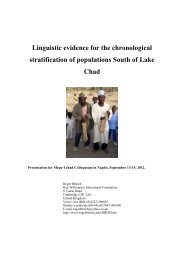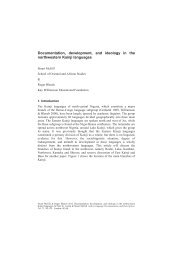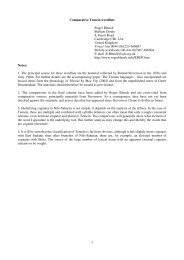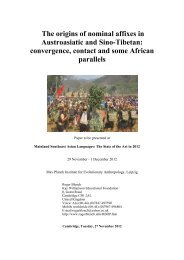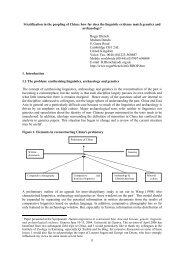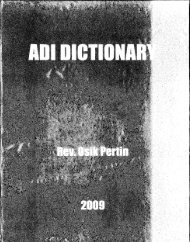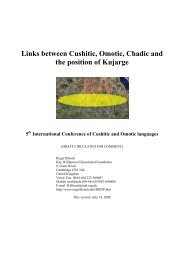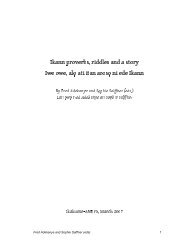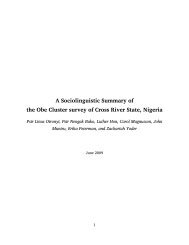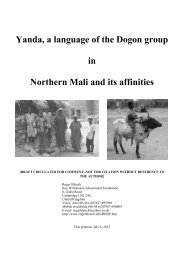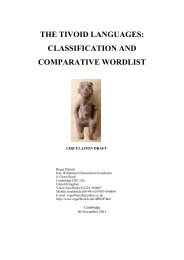Imperial grammar.pdf - Roger Blench
Imperial grammar.pdf - Roger Blench
Imperial grammar.pdf - Roger Blench
You also want an ePaper? Increase the reach of your titles
YUMPU automatically turns print PDFs into web optimized ePapers that Google loves.
<strong>Roger</strong> <strong>Blench</strong>: <strong>Imperial</strong> <strong>grammar</strong> and grassroots categories Circulation draft<br />
Table 3. Prepositional suffixes on Bura verbs<br />
Extension Underlying meaning Extended meaning<br />
-ɓəla out, outside, around thoroughly, completely<br />
-dza to the side of s.t.<br />
-ha together<br />
-hi down on top of<br />
-mta away from<br />
-nkər onto, on top of<br />
-nkir under, below, beneath<br />
-vi locative<br />
-wa into, inside substitutive, where s.t. replaces s.t. else<br />
Table 4. Affixes on Bura verbs marking number or degree of totality<br />
Extension Meaning Position<br />
-gi-, -gu-, - Completed action on multiple objects Infix, final suffix<br />
ga<br />
-ha Intensive or repeated action on a mass of Usually final suffix, can be in penultimate<br />
objects<br />
position<br />
-mya Completion of action on all objects (from Always final suffix<br />
standpoint of the subject).<br />
-nkər Repetitive Always final suffix<br />
-Vr(i) Action by a specific person Always final suffix, often combined with<br />
initial syllable reduplication<br />
-(r)ar Partial or tentative action by subject Always final suffix<br />
-tsa Partial action from standpoint of subject Always final suffix<br />
Table 5. Suffixes marking grammatical function on Bura verbs<br />
Extension<br />
Meaning<br />
-dzi<br />
Passive and middle voice<br />
-nta<br />
Causative, transitivising suffix<br />
-ta<br />
Completive aspect<br />
Table 6 shows a basic Bura which clearly once had a more general sense of beating rhythmically but is now<br />
applied to dancing. The extended forms (omitting TAM markers, valency markers and other grammatical<br />
extensions show how a wide variety of meanings can develop.<br />
Table 6. A basic Bura verb and its extended forms and meanings<br />
Verb Gloss<br />
batla To dance or keep step to music, beat rhythmically<br />
batlaɓəla To sharpen a piece of metal by beating it<br />
batlaha To sharpen by beating, to beat together<br />
batlaha To pound, or stomp with the feet, mud mixed for building<br />
batlimta To hammer a new mill stone until it is rough<br />
batlamya To tramp down by many footsteps; to wear down by much pounding<br />
batlinkər To do the job of sharpening or pounding over again<br />
batlinkir To beat on top of something<br />
batlawa To repair damage done to a sharpened knife or pitted stone<br />
It is not uncommon in Bura for the ‘basic’ or simplex verb to be missing; its form and sense can now only be<br />
reconstructed.<br />
A major question then becomes the degree to which these forms must be represented in the lexicon in order<br />
to have a complete description of the language. In North America, where similarly complex verb forms<br />
4



